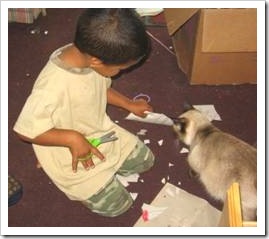 Parents often see themselves as “raising children”.
Parents often see themselves as “raising children”.
Not true.
Parents are actually raising future grownups and this is an important distinction, because grownups are independent, hopefully self-sufficient humans, whereas children are rather dependent and undeveloped beings who need continuous care and attention.
So in essence, no matter what we do today, we should do it with the final creation in mind – our future son or daughter when they are ready to say goodbye and beyond.
Will they be healthy and able to care for themselves so they can stay healthy?
Will they have the knowledge they need to not only survive in the world but also succeed?
Will they have the strength of character to do well and be happy?
But daily life is quite different for most parents. In most homes, parents are busy people and when they interact with their kids, it is often to do with housekeeping, cleaning up their messy rooms, getting off the computer or getting ready to go somewhere in a hurry. Most of the communication between parents and their children is aimed at right now (“Come here”, “Stop making noise”, “Clean your room” or “Let’s go”) and sometimes at the recent past (“Why did you…”, “If only you had…” or “You should have…”).
If the future is mentioned in the family context, it is often as part of arrangements for the following day or maybe an upcoming event.
Even when important decisions are made, they are often aimed at a shorter range than they could be. One major one is studies. Parents do their best to help their kids choose the best course of studies, making high school decisions towards the end of primary school and university decisions towards the end of high school. But the truly important goals of all this studying – the kids’ career and lifestyle – seem to be too far away to be discussed.
 Decisions that will affect the kids’ life as grownups are “divided and conquered” and everyone goes back into “action mode” and plows ahead towards a yet not very well defined future.
Decisions that will affect the kids’ life as grownups are “divided and conquered” and everyone goes back into “action mode” and plows ahead towards a yet not very well defined future.
If you are shaking your head by now and saying, “What do you expect? How do I know what my kids will be like when they grow up? I don’t (or didn’t) even know what they’ll be like when they become teenagers. Sometimes, I don’t know what will happen tomorrow”.
I agree. We cannot predict the future of our children.
But maybe it does not matter exactly what their future will be like. Maybe we can still give them the best chance at whatever comes their way by focusing on some imaginary grown-up “them”. Doing this is not about having a concrete plan of action, it is about seeing our kids as separate human being rather than extensions (some would even say burden) of us.
So let’s take some typical family situations and see how this might play out.
When your baby starts eating with a teaspoon, the mess just seems to spill everywhere – on the table, on the chair, on the clothes and on you. Even the most patient parent can get sick of this quickly and start to clean the baby up and eventually feed them.
I have had the good fortune of spending a few months caring for each of my daughters when they were babies. When Eden was young, I cleaned her and fed her, all the while telling her she needed to stop making a mess. Well, Eden took a long time to stay clean when she ate and do other things “properly” and I believe this contributed to her current decision-making difficulty.
By the time Noff came around, I had learned that lesson and just let her “experience” her food and her teaspoon. Noff is by far our most physically confident and decisive child, which is probably related to me making a different choice.
Two of Ronit’s sisters now have little walking munchkins. They go everywhere and try to reach everything. One of them keeps her home as it was before and spends much of her time chasing her child and restricting his movements, while the other has lifted the obvious hazards out of the way and lets her son roam freely and experiment.
Sure, rearranging your household is a hassle, especially since you will need to put everything back when your child grows a bit, but which child do you think will grow up more confident and capable physically? Which of them will have a better relationship with his parents?
 School-aged kids need their sleep. Going to bed too late means a grumpy day later and poor performance on all fronts. So when your daughter’s assignment is due tomorrow and it is 8pm, should she stay up and finish or go to bed?
School-aged kids need their sleep. Going to bed too late means a grumpy day later and poor performance on all fronts. So when your daughter’s assignment is due tomorrow and it is 8pm, should she stay up and finish or go to bed?
You may be thinking, “Who needs a grumpy kid tomorrow? I won’t be able to get her out of bed. Upstairs you get, young lady”. This will make the following day better for you and may teach your daughter a lesson in planning, but what about being responsibly? What about determination and not quitting when things get tough? Would you rather raise a woman who compromises to avoid discomfort or one you can trust?
And when you are tired and “can’t be bothered” (an all too common Australian expression) to make dinner, should you indulge everyone in a quick visit to your local McDonald’s and buy everyone their choice of tasty, no-hassle food? The benefits from that will not even last until breakfast.
The alternative, of course, is harder, but you could get the kids to help make dinner out of fresh ingredients and teach them things like teamwork, nutrition and satisfaction in their own creations. I doubt the effects of that experience will ever wear off.
Back at school, teachers are familiar with assignments that are prepared too well to have been done by a student. When time runs out, do you worry about your child’s next score on the report card and “lend a helping hand just a little”? Doing it may help in the short term, but at what cost?
Do you want your kids to put external approval above things like honesty, good time management and responsibility? Which will serve them better when they grow up, their good grades from 3rd Grade or a strong character? If they score low or even fail, but learn at a young age that their actions in life produce consequences, is that really so bad?
 Many parents are so focused on short-term academic scores they also pressure their children to focus on reading, writing and math, while abandoning art, music and sport. However, research has shown that physically active, creative children grow up to be more successful than those who have spent their time studying. For example, by the end of high school, kids who play a musical instrument from 5th Grade score 23% better on average than the general population.
Many parents are so focused on short-term academic scores they also pressure their children to focus on reading, writing and math, while abandoning art, music and sport. However, research has shown that physically active, creative children grow up to be more successful than those who have spent their time studying. For example, by the end of high school, kids who play a musical instrument from 5th Grade score 23% better on average than the general population.
When you walk through the door, tired and hungry, it is not easy to consider your little boy’s future as he tugs at your pants and asks to play some soccer (Tsoof did this to me every day). This is why you should prepare and develop your responses ahead of time. After a week of pant tugging, you know it will happen next week, so sit down, spend some time imagining your little ones growing up – finishing school, looking to work, working, starting a family – and ask yourself, “How should I treat them so that they will gradually become confident, independent and happy people?”
Whenever your kids show confidence and independence, you will know you have done well and they have mastered yet another life skill.
I will leave you with something that happened to me yesterday and made me think Ronit and I are on the right track with this.
This year, Noff struggled a bit with her new teacher and then had a hard time with a snobby girl. Ronit and I supported her and counseled her, but did not act on her behalf. Over time, she managed to get through both challenges.
Yesterday, as Noff was leaving for school, I kissed her and said, “See you, Noff, have a great day”.
She gave me a big, excited, confident smile and said, “I WILL!”
With this attitude, of course she will.
Inspired parenting,
Gal











